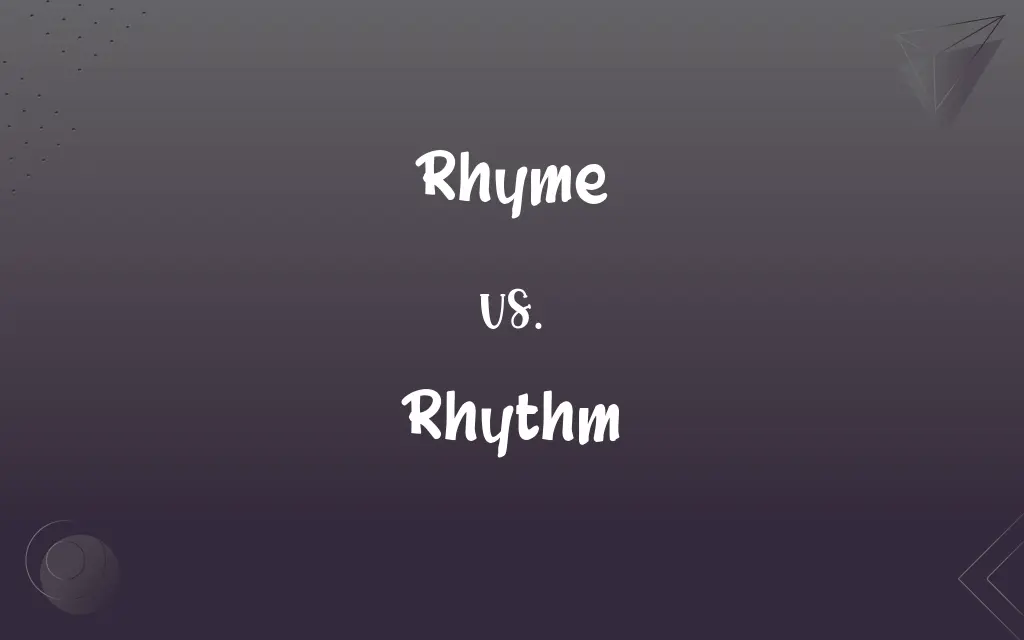Rhyme vs. Rhythm: What's the Difference?
Edited by Aimie Carlson || By Janet White || Updated on October 25, 2023
Rhyme is the correspondence of ending sounds; Rhythm is the pattern of stressed and unstressed beats.

Key Differences
Rhyme refers to the similarity in sound between the ends of words, especially when they are used at the ends of lines of poetry. Rhythm, on the other hand, pertains to the beat or tempo of speech and music, or the pattern of stressed and unstressed syllables in a line of verse.
In poetry, Rhyme gives a sense of harmony and closure to verses, making them memorable. Rhythm, conversely, gives a poem its pace, influencing how it should be read or recited.
A poem might have Rhyme without having a consistent Rhythm. For instance, the ends of lines might sound the same, but the beats or stresses in those lines could be irregular.
Rhythm can be found in everyday speech, prose, music, and even the natural world, such as the rhythm of a heartbeat or footsteps. Rhyme is more specific to the repetition of similar sounds in words, often used for artistic or musical effect.
While Rhyme often serves aesthetic and mnemonic purposes in literature, Rhythm has a broader application, evoking emotions, emphasizing important points, and making language more engaging and musical.
ADVERTISEMENT
Comparison Chart
Definition
Similarity of sound between words or the ends of words.
Pattern of beats or stresses in speech and music.
Usage in Poetry
Gives harmony and closure to verses.
Provides pace and dictates how a poem should be read.
Presence
Specific to repetition of sounds in words.
Found in speech, music, and nature.
Purpose
Aesthetic and mnemonic in literature.
Evokes emotion and adds musicality to language.
Variability
Can be full, slant, internal, etc.
Can be regular, irregular, free, or structured.
ADVERTISEMENT
Rhyme and Rhythm Definitions
Rhyme
Correspondence of sound between words or the ends of words.
The sun is done; the night has won.
Rhythm
A strong, regular, repeated pattern of movement or sound.
The rhythm of the music had everyone dancing.
Rhyme
Words that have the same ending sound.
Hat and cat rhyme with each other.
Rhythm
The pattern of regular or irregular beats.
The rhythm of the raindrops was soothing.
Rhyme
A short poem or verse that uses sound similarity.
Roses are red, violets are blue, sugar is sweet, and so are you.
Rhythm
The arrangement of spoken words alternating stressed and unstressed elements.
The teacher emphasized the rhythm of the poem as she read aloud.
Rhyme
Correspondence of sounds at the ends of words or phrases, especially when involving the last stressed vowel and all succeeding sounds in each of two or more such words or phrases.
Rhythm
The systematic arrangement of musical sounds, principally according to duration and periodical stress.
Each culture has its unique rhythm in traditional songs.
Rhyme
A word that exhibits such correspondence with another, as behold and cold.
Rhythm
A particular type of pattern formed by sequences of notes, chords, etc.
Jazz often features a syncopated rhythm.
Rhyme
A poem or verse employing such correspondence as a formal feature, especially at the ends of lines.
Rhythm
Movement or variation characterized by the regular recurrence or alternation of different quantities or conditions
The rhythm of the tides.
Rhyme
Poetry or verse of this kind.
Rhythm
The patterned, recurring alternations of contrasting elements of sound or speech.
Rhyme
To form a rhyme.
Rhythm
The patterning of musical sound, as by differences in the timing, duration, or stress of consecutive notes.
Rhyme
To compose rhymes or verse.
Rhythm
A specific kind of such patterning
A waltz rhythm.
Rhyme
To make use of rhymes in composing verse.
Rhythm
A group of instruments supplying the rhythm in a band.
Rhyme
To put into rhyme or compose with rhymes.
Rhythm
The pattern or flow of sound created by the arrangement of stressed and unstressed syllables in accentual verse or of long and short syllables in quantitative verse.
Rhyme
To use (a word or words) as a rhyme.
Rhythm
The similar but less formal sequence of sounds in prose.
Rhyme
Rhyming verse (poetic form)
Rhythm
A specific kind of metrical pattern or flow
Iambic rhythm.
Rhyme
A thought expressed in verse; a verse; a poem; a tale told in verse.
Rhythm
The sense of temporal development created in a work of literature or a film by the arrangement of formal elements such as the length of scenes, the nature and amount of dialogue, or the repetition of motifs.
Rhyme
(countable) A word that rhymes with another.
Rhythm
A regular or harmonious pattern created by lines, forms, and colors in painting, sculpture, and other visual arts.
Rhyme
A word that rhymes with another, in that it is pronounced identically with the other word from the vowel in its stressed syllable to the end.
Rhythm
The pattern of development produced in a literary or dramatic work by repetition of elements such as words, phrases, incidents, themes, images, and symbols.
Rhyme
(uncountable) Rhyming: sameness of sound of part of some words.
Rhythm
Procedure or routine characterized by regularly recurring elements, activities, or factors
The rhythm of civilization.
The rhythm of the lengthy negotiations.
Rhyme
(linguistics) rime
Rhythm
The variation of strong and weak elements (such as duration, accent) of sounds, notably in speech or music, over time; a beat or meter.
Dance to the rhythm of the music.
Rhyme
(obsolete) Number.
Rhythm
A specifically defined pattern of such variation.
Most dances have a rhythm as distinctive as the Iambic verse in poetry
Rhyme
(ambitransitive) To compose or treat in verse; versify.
Rhythm
A flow, repetition or regularity.
Once you get the rhythm of it, the job will become easy.
Rhyme
Of a word, to be pronounced identically with another from the vowel in its stressed syllable to the end.
Rhythm
The tempo or speed of a beat, song or repetitive event.
We walked with a quick, even rhythm.
Rhyme
(reciprocal) Of two or more words, to be pronounced identically from the vowel in the stressed syllable of each to the end of each.
Rhythm
The musical instruments which provide rhythm (mainly; not or less melody) in a musical ensemble.
The Baroque term basso continuo is virtually equivalent to rhythm
Rhyme
To somewhat resemble or correspond with.
Rhythm
A regular quantitative change in a variable (notably natural) process.
The rhythm of the seasons dominates agriculture as well as wildlife
Rhyme
To number; count; reckon.
Rhythm
Controlled repetition of a phrase, incident or other element as a stylistic figure in literature and other narrative arts; the effect it creates.
The running gag is a popular rhythm in motion pictures and theater comedy
Rhyme
An expression of thought in numbers, measure, or verse; a composition in verse; a rhymed tale; poetry; harmony of language.
A ryme I learned long ago.
He knewHimself to sing, and build the lofty rime.
Rhythm
A person's natural feeling for rhythm.
That girl's got rhythm, watch her dance!
Rhyme
Correspondence of sound in the terminating words or syllables of two or more verses, one succeeding another immediately or at no great distance. The words or syllables so used must not begin with the same consonant, or if one begins with a vowel the other must begin with a consonant. The vowel sounds and accents must be the same, as also the sounds of the final consonants if there be any.
For rhyme with reason may dispense,And sound has right to govern sense.
Rhythm
In the widest sense, a dividing into short portions by a regular succession of motions, impulses, sounds, accents, etc., producing an agreeable effect, as in music poetry, the dance, or the like.
Rhyme
Verses, usually two, having this correspondence with each other; a couplet; a poem containing rhymes.
Rhythm
Movement in musical time, with periodical recurrence of accent; the measured beat or pulse which marks the character and expression of the music; symmetry of movement and accent.
Rhyme
A word answering in sound to another word.
Rhythm
A division of lines into short portions by a regular succession of arses and theses, or percussions and remissions of voice on words or syllables.
Rhyme
To make rhymes, or verses.
There marched the bard and blockhead, side by side,Who rhymed for hire, and patronized for pride.
Rhythm
The harmonious flow of vocal sounds.
Rhyme
To accord in rhyme or sound.
And, if they rhymed and rattled, all was well.
Rhythm
The basic rhythmic unit in a piece of music;
The piece has a fast rhythm
The conductor set the beat
Rhyme
To put into rhyme.
Rhythm
Recurring at regular intervals
Rhyme
To influence by rhyme.
Hearken to a verser, who may chanceRhyme thee to good.
Rhythm
An interval during which a recurring sequence of events occurs;
The neverending cycle of the seasons
Rhyme
Correspondence in the sounds of two or more lines (especially final sounds)
Rhythm
The arrangement of spoken words alternating stressed and unstressed elements;
The rhythm of Frost's poetry
Rhyme
A piece of poetry
Rhythm
Natural family planning in which ovulation is assumed to occur 14 days before the onset of a period (the fertile period would be assumed to extend from day 10 through day 18 of her cycle)
Rhyme
Compose rhymes
Rhyme
Be similar in sound, especially with respect to the last syllable;
Hat and cat rhyme
Rhyme
A word that has a similar end sound to another.
The word moon rhymes with balloon.
Rhyme
A repetition of similar sounding words occurring at the end of lines in poems or songs.
The stars at night, shine so bright.
FAQs
What is Rhyme in poetry?
Rhyme refers to the similarity in sound between the ends of words, especially when used at the ends of lines in poetry.
Why is Rhyme used in songs?
Rhyme is used in songs for musical effect, to make lyrics memorable, and to create a sense of harmony.
Is Rhythm exclusive to poetry?
No, rhythm is found in everyday speech, prose, music, and the natural world.
Is Rhythm the same as beat?
While closely related, rhythm is the pattern of beats, while the beat is the basic unit of time in music.
How does Rhythm affect a poem?
Rhythm gives a poem its pace and dictates how it should be read, adding musicality and emotional depth.
What is internal Rhyme?
Internal rhyme is when a word in the middle of a line rhymes with a word at the end of the same or neighboring line.
Can a poem have Rhyme without Rhythm?
Yes, a poem can have rhyme without a consistent rhythm, though both elements often complement each other.
What's the difference between a full Rhyme and a slant Rhyme?
A full rhyme has an exact match in sound, while a slant rhyme has a near, but not exact, sound match.
Can prose possess Rhyme and Rhythm?
Yes, prose can have elements of rhyme and rhythm, though they are more commonly associated with poetry.
What is the effect of Rhyme in advertising?
Rhyme can make advertisements more memorable and catchy.
How does one identify Rhythm in writing?
Rhythm can be identified by recognizing the pattern of stressed and unstressed syllables in written text.
Can Rhythm be irregular?
Yes, rhythm can be irregular, especially in conversational or free verse styles.
How does Rhythm contribute to language?
Rhythm adds musicality, emphasizes important points, and can evoke emotions in language.
Are Rhyme schemes necessary for all poems?
No, some poems, like free verse, don't follow specific rhyme schemes.
How do Rhyme and Rhythm work together in literature?
Together, rhyme and rhythm create a harmonious sound, making language more musical and engaging.
About Author
Written by
Janet WhiteJanet White has been an esteemed writer and blogger for Difference Wiki. Holding a Master's degree in Science and Medical Journalism from the prestigious Boston University, she has consistently demonstrated her expertise and passion for her field. When she's not immersed in her work, Janet relishes her time exercising, delving into a good book, and cherishing moments with friends and family.
Edited by
Aimie CarlsonAimie Carlson, holding a master's degree in English literature, is a fervent English language enthusiast. She lends her writing talents to Difference Wiki, a prominent website that specializes in comparisons, offering readers insightful analyses that both captivate and inform.































































